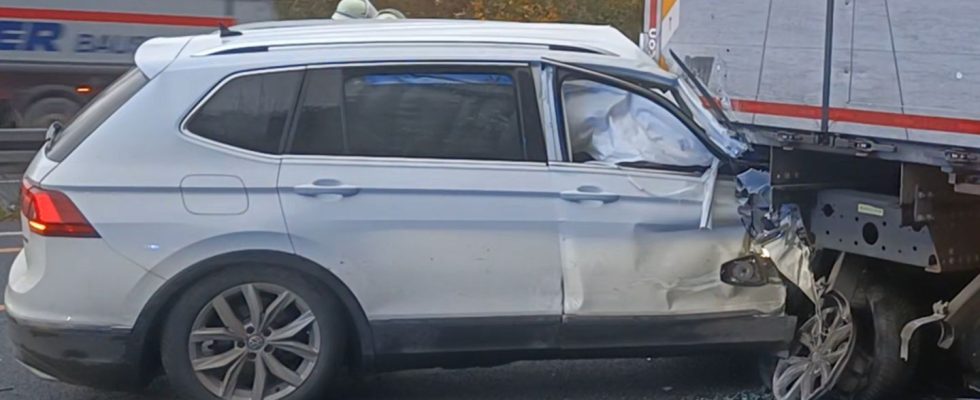Road safety
Still fit to drive? EU states for regular self-disclosure – Germany wants to vote against it
The EU is planning a medical self-disclosure if the driver’s license is to be extended
© Justin Brosch / DPA
In mathematical terms, a small town dies on the streets of the EU every year: more than 20,000 people. The EU wants to change this, among other things, through new driving license requirements. There could be new rules for millions of people in Germany in the future.
Anyone who wants to have a driver’s license extended in the future must do so according to the will of the EU states fill out a questionnaire with health questions. This means that such a self-disclosure could be required in Germany every 15 years in the future, according to information from the EU countries on Monday. During negotiations on new driving license rules, the German Ministry of Transport was unable to insist that there should be no such self-disclosure. Federal Transport Minister Volker Wissing (FDP) had therefore announced that he would not agree to the project.
The revision of the rules is based on a proposal from the EU Commission that was presented in March. The EU states have now adopted their position on this, with which they want to enter into negotiations with Parliament.
Self-disclosure when renewing your driving license
When renewing driving licenses, it should be examined whether holders are still physically and mentally capable of driving a car or motorcycle. This includes limitations such as poor eyesight, heart disease, epilepsy or alcoholism, which also pose a danger to other people in traffic. However, a doctor does not have to examine whether your own eyesight or drinking behavior poses a risk. Each country can also choose to only require self-certification.
According to the plans, driving licenses for cars, scooters and motorcycles are valid for 10 to 15 years – stricter rules apply for buses and trucks. At their discretion, each country is also given the opportunity to shorten these times for older drivers. The EU Commission originally proposed that driving licenses for people over 70 years of age should be renewed every five years.
Big debate about seniors behind the wheel
With the revision of the EU driving license rules, there was again a big debate in Germany as to whether older people pose a risk on the road. The German Road Safety Council rejects a possible mandatory check of the driving ability of seniors as disproportionate. Older people have a disproportionately low number of accidents compared to their share of the population.
In the opinion of Siegfried Brockmann, head of accident research for insurers, this line of argument misses the point. In absolute terms, seniors do not pose an excessive risk of accidents. But they would drive a lot less. In terms of mileage, the accident risk of people over 75 years of age is comparable in certain aspects to the high-risk group of very young drivers.
As figures from the Federal Statistical Office in Wiesbaden show on Monday, older drivers are more often to blame than younger drivers when they are involved in accidents that result in personal injury. According to statistics, people aged 65 and over were the main culprits in more than two thirds of these cases (69 percent) last year.
Accompanied driving from the age of 17
What Germans have been allowed to do since 2011 is setting a precedent across the EU. In other countries, minors could also sit behind the wheel next to parents or other accompanying persons. According to the project, this companion must be at least 24 years old and have had a driving license for at least five years. In addition, she must not have been banned from driving within the past five years. Up to now, accompanying persons in Germany have to be at least 30 years old. There will also be a probationary period throughout the EU in the future.
What is new is that accompanied driving will also be possible for trucks in the future. The EU states are largely following the EU Commission’s original proposal. The FDP MEP Jan-Christoph Oetjen called for accompanying driving to be permitted from the age of 16.
Digital driving license is coming
The EU states also agreed that in the future there should also be a digital driving license that can be saved on your cell phone. This should be accessible free of charge. According to the Commission proposal, there should still be a physical version of the driving license.
Harsh criticism of proposals from the European Parliament
The first proposals from French Green MP Karima Delli were met with clear criticism even from party friends in Germany. For example, she proposed mandatory medical checks, significant restrictions for novice drivers and stricter speed limits. Given the clear cross-party criticism, it is almost impossible that these proposals will be accepted in exactly this way.
However, Delli could prevail in individual aspects. “Unfortunately, there is a majority in the European Parliament’s Transport Committee in favor of the mandatory introduction of medical tests,” said CDU MEP Jens Gieseke on Monday.
Before new rules can come into force, the EU Parliament must decide on a position and then agree on a compromise with the EU states. The Transportation Committee is expected to vote on a position Thursday. The entire Parliament can then vote on a position based on the decision in the Transport Committee and negotiations can begin.
Negotiations could soon be concluded
The positioning of the EU states and the Parliament are important steps on the way to new guidelines. The aim is to conclude the negotiations before the European elections next year. As with other directives, Germany must then implement the requirements into national law. The EU states’ proposal currently stipulates a period of three years after the regulation comes into force.

